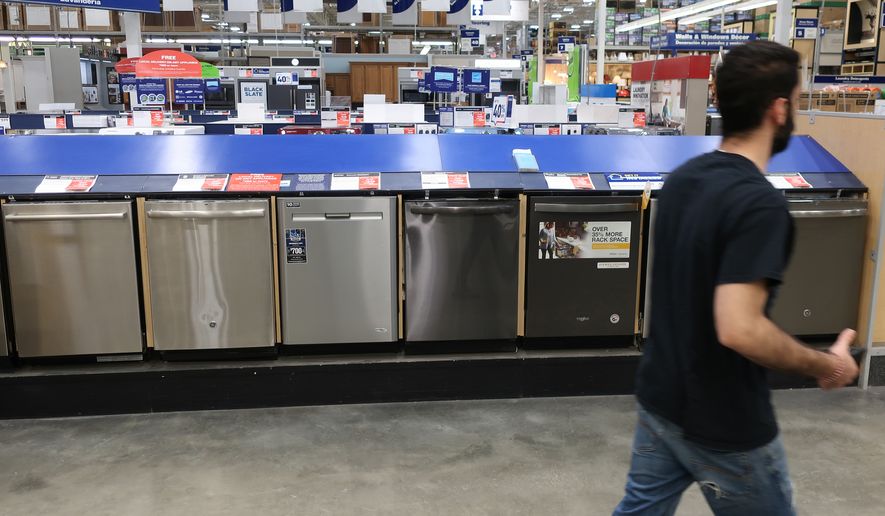Consumer advocates won a federal regulatory battle for more powerful household appliances in the waning days of the Trump administration, but their victory may be short-lived.
A proposed Energy Department rulemaking would scrub the Oct. 30 rule creating a product class of residential 60-minute dishwashers, as well as the Dec. 16 rule establishing a class for 45-minute, front-loading clothes washers and dryers and 30-minute, top-loading washers and dryers.
The latest effort by the Biden administration to reverse all things Trump would foil a years-long campaign to bring faster, more effective dishwashers to the American public spearheaded by the free-market Competitive Enterprise Institute.
Federal performance standards on household appliances are intended to conserve energy and water, but CEI general counsel Sam Kazman and others argue that the rules actually end up wasting energy because they force consumers to pre-wash dishes or run additional cycles.
“Some folks do extensive pre-scrubbing of their dishes. It’s the only way they come out clean when they go through the dishwasher, and that’s a pretty wasteful habit,” Mr. Kazman said. “Other folks just give up on dishwashers and wash everything by hand, which is also wasteful from the standpoint of water and energy. And some people actually run double cycles — they run the dishwasher once, and then they run it again — and that of course is hugely wasteful.”
In its Aug. 10 rulemaking, however, the Department of Energy said the Trump-era rules for the short-cycle product classes failed to meet the requirements of the Energy Policy and Conservation Act on energy efficiency.
“Creation of those short-cycle classes effectively removed the energy and water conservation standards that had previously applied to those products,” the department said in the Federal Register.
Those supporting the Biden administration proposal include the Association of Home Appliance Manufacturers, 16 Democratic state attorneys general, environmental groups and the major California investor-owned utilities, which said that dishwashers already include a short cycle.
“Data published by DOE relating to dishwasher cleaning performance indicated that a dishwasher quick cycle is perfectly adequate at cleaning a normal load of dishes,” said the California utilities, including Pacific Gas and Electric. “Across 29 tested units with a quick cycle option, the majority of units actually received a higher per-cycle cleaning index score than their normal cycle.”
The attorneys general cited DOE estimates showing that by 2030, the energy efficiency standards will have resulted in more than $2 trillion in consumer utility savings and 2.6 billion tons in carbon dioxide emissions.
“The Short-Cycle Class Rules have weakened the program by removing standards for important consumer products and creating unjustified product classes, which in turn opened the possibility of similar proposals in the future that could further undermine the program,” the Democratic state prosecutors said.
The manufacturers’ association, which represents 150 companies that make 90% of major, portable and floor-care appliances shipped to the U.S., said a separate product class “would likely have negative, unintended consequences.”
“Retaining these new product classes could strand manufacturer investments in efficiency and require new investments to develop new products; create new regulation; introduce uncertainty for manufacturers until DOE develops energy conservation standards for the new product classes; increase test burden for laundry products; and create possible disharmony in North America for laundry energy conservation standards,” the association said.
This week, our office urged the Dept of @ENERGY not to revoke 2020 rules that improved dishwashers and washing machines for consumers.
— Mark Brnovich (@GeneralBrnovich) October 15, 2021
Revoking these rules will limit consumers’ choices and eliminate useful products that can help people with busy lives. https://t.co/pN34vslzVB
Meanwhile, CEI argued that “DOE has failed to consider the wasted water and energy caused by hand-washing and other actions that consumers take in order to deal with slow dishwashers,” citing 2011 department data showing that handwashing uses 140% of the energy use and 350% the water of dishwashers.
“Our survey showed that 23% of consumers always wash their dishes by hand because their
dishwasher takes too long,” CEI said in its letter. “Another 27% of consumers do so often and 37% do so sometimes. In total 87% of consumers hand wash dishes at least sometimes due to the slow speed of their dishwashers.”
The free-market group also disputed the department’s claim that the law prevented the creation of a short-cycle product class, saying that “Congress designed EPCA to allow consumers to continue to have choices and not be automatically forced into whatever DOE regards as the most efficient product.”
The Trump-era proposal drew more than 2,200 comments in support, including entreaties such as, “Please mother of God, allow someone to make a dishwasher that will get my dishes for a family of 5 clean enough, fast enough to empty the dishwasher by bedtime!”
Arizona Attorney General Mark Brnovich, a Republican, said the proposed rule would “block innovation in technology and new classes of products in the marketplace to meet citizens’ demands.”
“The technology exists for more helpful machines that meet the needs of modern lifestyles, and the Department should allow the current — and legally valid — final rules to stand rather than manufacture allegations of a defect in its previous rulemaking to fit a political agenda contrary to the real-life needs of the people,” Mr. Brnovich’said.
FreedomWorks President Adam Brandon said the effort shows “just how little the left cares about the lives of everyday working Americans. They would rather appease radical environmentalists.”
The comment period deadline on the rulemaking was Oct. 12.
• Valerie Richardson can be reached at vrichardson@washingtontimes.com.




Please read our comment policy before commenting.